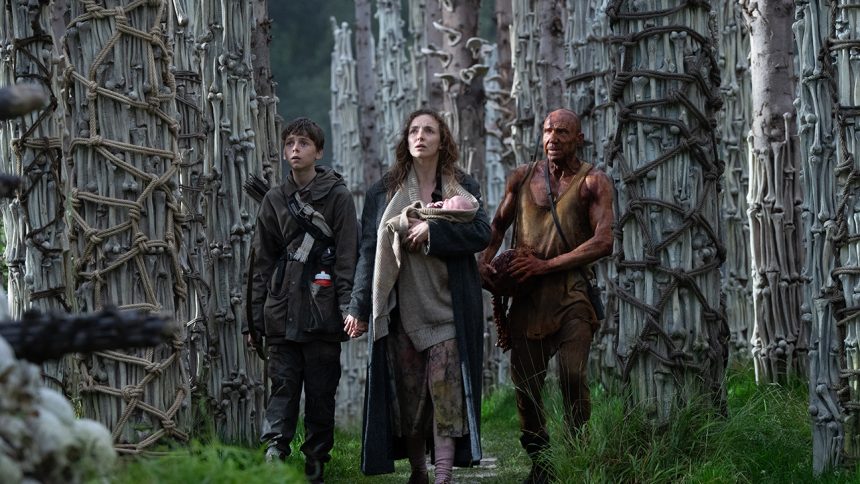‘28 Years Later’: What the Critics Are Saying
After more than two decades, director Danny Boyle and writer Alex Garland have returned to the world of the infected with 28 Years Later, the long-incubating sequel to 2002’s 28 Days Later.
The film hosted its world premiere in London on Wednesday, with reviews from critics arriving shortly after — and so far the results are strong. With 78 reviews in, it stands at 95 percent critics rating on Rotten Tomatoes.
Read on for a sampling of what critics are saying about the film, which opens Friday and stars newcomer Alfie Williams, Jodie Comer, Aaron Taylor-Johnson and Ralph Fiennes.
The Hollywood Reporter‘s David Rooney wrote, “One of the chief rewards of 28 Years Later is that it never feels like a cynical attempt to revisit proven material merely for commercial reasons. Instead, the filmmakers appear to have returned to a story whose allegorical commentary on today’s grim political landscape seems more relevant than ever. Intriguing narrative building blocks put in place for future installments mean they can’t come fast enough.”
You Might Also Like
Rolling Stone‘s David Fear wrote in his review of Boyle, “That he simply didn’t retroactively ruin the first film by releasing a new franchise-expanding, Easter-egg hunt of an entry just for the sake of it would’ve been enough. Yet the filmmaker and his collaborators have also deepened their vision of a world on the brink, adding in strong elements of British folk horror, anxiety over good-old-days nationalism and an emphasis on what happens to a generation growing up in the shadow of normalized chaos.”
Writing for Entertainment Weekly, Jordan Hoffman opined, “Stylistically, Boyle throws a lot of things into a blender here, and somehow it all works. Early scenes intercut stock footage of Brittania propaganda films, which has no other motivation than to provide a vibe. Every kill of an infected slams on the brakes with a freeze frame, and the editing takes an occasionally cavalier approach to presenting sequences linearly, opting instead for a flush of sensation.”
In his review for New York magazine, Bilge Ebir questioned if the film was hurt by it needing to set up a trilogy, with the critic writing, “Despite several moving moments, and excellent performances from Fiennes and Taylor-Johnson, the film has an omnibus quality that makes it feel like a collection of loosely connected ideas instead of something that coheres into an actual vision, or even a story. Maybe it’ll all come together in the end. Or maybe it’s not supposed to. After all, what would be more appropriate for our moment than a franchise movie that devolves into a series of anguished and disjointed screams? 28 Years Later is choppy, muddled, strange, and not always convincing. But I’m not sure I’ll ever forget it.”
Indiewire‘s David Ehrlich writes in his review, “with more earnest grace than any films have tried to humanize zombies before, 28 Years Later is increasingly preoccupied with the idea that the difference between “us” and “them” is only a matter of perspective. Honestly, I cringed at the movie’s first indications that it was going to explore how the infected have evolved (so boring, so far removed from the primitivism of the original), but Garland’s script iterates on that concept in such radical and unexpected ways that I couldn’t help but surrender to its potential.”
I09’s Germain Lussier writes that the world-building answered questions he never thought to ask about a zombie-infected world: “What would 28 years without humans do to an ecosystem? What human mistakes may have lingered over that time? What, if any, human traits do the zombies still carry with them? Is there a zombie pecking order? 28 Years Later consistently fires on all cylinders but then also hits you with a moment or idea that pushes things to a whole new level, and you almost wish there was a whole movie just about that.”
The Associated Press‘ Jake Coyle took issue with a visual style he called “frequently gratingly disjointed,” but concluded, “Buried in here are some tender reflections on mortality and misguided exceptionalism, and even the hint of those ideas make “28 Years Later” a more thoughtful movie than you’re likely to find at the multiplex this time of year. This is an unusually soulful coming-of-age movie considering the number of spinal cords that get ripped right of bodies.”
Vanity Fair‘s Richard Lawson writes, “Three quarters of the way through, 28 Years Later slows the horror to become a rumination on death’s inevitability and life’s carrying on even in the grips of calamity. It’s poignant in an odd way, positioned as it is in what is ostensibly a horror film. Really, Boyle’s film is more post-apocalyptic anthropology than anything else, an alluring peer into a near future in which humanity is at a fraught crossroads. Which isn’t to say that the film isn’t frightening. There are myriad unbearably tense and disturbing scenes, steeped in the impossible dread of being stuck somewhere far from safety, surrounded by unseen things lurking in the shadows.”







